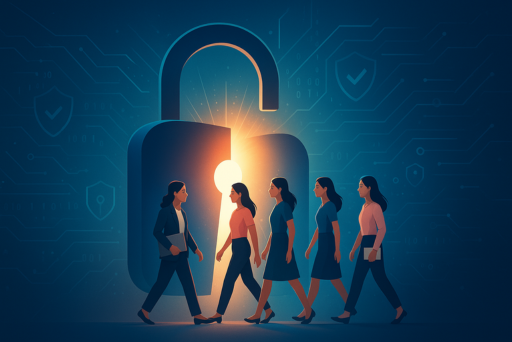Across the world, cybersecurity remains one of the least gender-balanced sectors. The (ISC)2Cybersecurity Workforce Study 2023 estimates that women make up only 20 to 25 percent of the global cybersecurity workforce. India has historically mirrored this pattern, where unequal access, limited awareness, and entrenched perceptions have kept women from entering technical fields in large numbers.
Against this backdrop, NIIT Foundation’s Cyber Suraksha initiative has achieved a milestone that reflects both inclusion and innovation. In just two years, the program has raised female participation from around 30–35 percent in its first year to over 40 percent in the second. In states such as Uttar Pradesh, Bihar, and Karnataka, young women are increasingly choosing to learn cyber skills, protecting their families, supporting their communities, and building professional identities in one of the world’s fastest-growing domains.
Expanding Digital Literacy, Building Confidence
Launched in 2022, Cyber Suraksha set out with a bold goal: to train one million Indians in cybersecurity by 2025. The program has already trained more than five lakh learners and impacted over one million individuals across 27 states and five Union Territories, reaching learners from both urban and rural areas of India.
Cyber Suraksha’s curriculum begins with everyday digital safety and progresses to advanced cyber-awareness and employability skills. Designed in bilingual formats and delivered through flexible online and classroom modes, the learning model ensures that even first-generation students and women from smaller towns can participate with confidence. Trainers regularly conduct community workshops where women share their knowledge within local groups, transforming participants into educators and advocates for digital safety.
From Learning to Livelihood
The success of Cyber Suraksha lies not only in participation but in outcomes. Its advanced Workforce stream, a 130-hour employability-focused course, prepares learners for roles in cyber support, information protection, and digital-risk management. The program’s completion rates have climbed dramatically, from 123 percent in its first year to 160 percent in the second, showing growing commitment among learners and strong delivery on the ground.
So far, more than 22,000 learners trained under Cyber Suraksha have moved into professional opportunities across the technology and services sector. Many are first-time professionals and women who previously had no exposure to cybersecurity as a career. Their journeys, from classroom learners to active contributors in India’s digital workforce, demonstrate how structured training and mentorship can translate into tangible livelihood outcomes.
Across cities and towns, these learners are making a visible difference. A young graduate in Patna now guides neighbourhood businesses on secure digital transactions. In Lucknow, women
trained under the program lead awareness sessions for school students and homemakers. In Bengaluru, participants have joined cybersecurity teams that protect data and digital infrastructure. Each example adds to a widening network of women shaping India’s digital safety.
Inclusion as a Driver of Security
India’s digital economy is expanding at an extraordinary pace. The Comprehensive Modular Survey: Telecom (2025) by the Ministry of Statistics and Programme Implementation shows that 86.3 percent of Indian households have internet access, and 94 percent of youth aged 15–29 use the internet regularly. As this connected population grows, the need for secure practices and skilled professionals becomes ever more critical.
Cyber Suraksha’s rise in female participation demonstrates that inclusivity is not a secondary goal, it is central to building resilience. When women gain access to technology education, they become catalysts for safer digital communities. Diversity in cybersecurity brings new perspectives, strengthens problem-solving, and ensures that technology serves everyone equitably.
Toward a Secure and Equitable Digital Future
By combining accessibility, employability, and social inclusion, NIIT Foundation is proving that India’s gender gap in cybersecurity can be closed, and that doing so strengthens the nation’s digital ecosystem. As India moves deeper into its digital decade, initiatives like Cyber Suraksha reaffirm a simple truth: empowering women to learn, lead, and secure the online world is not only a matter of equality, it is a cornerstone of national security.















